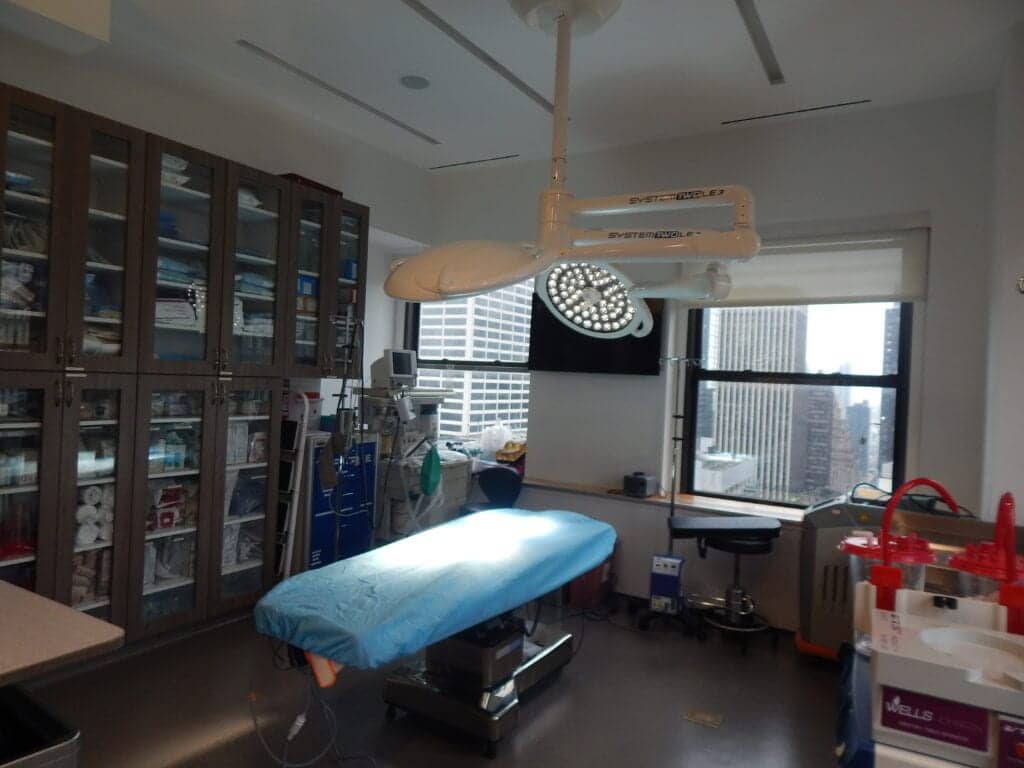From metabolic aesthetics to dermatology, the Shafer Clinic offers a holistic approach to meet patients’ needs. Drs David Shafer and Dendy Engelman pictured l-r (photo courtesy of the Shafer Clinic)
By Tonya Johnson
“When I opened my practice I didn’t have any money or any experience with a steady stream of clients. I got 10 no-interest credit cards, then maxed them out to buy furniture and pay rent. I was able to pay them all off in one year. I took a gamble,” says double-board certified (surgery and plastic surgery) plastic surgeon David Shafer, MD, FACS.
Sometimes that’s what it takes.
Shafer started out with two patients a day in a single room and built his way up to a three-story Fifth Avenue facility with an operating room, a skin and laser lab, multiple treatment/recovery rooms, a consultation and educational event space (plus some of the best views of the Manhattan skyline).
Shafer Clinic Skin and Laser Lab
Today he says, “Patients are excited about booking aesthetic treatments because they haven’t been able to travel, go out to dinner, or buy clothes for parties. There’s nothing to do right now, so the people who are lucky enough to still have jobs come in to spend money on themselves.”
THE FUTURE OF PLASTIC SURGERY
Shafer is trying to ready the practice for a new century, and it’s not just about plastic surgery. “We have dermatology; we have all of the noninvasive aesthetic treatments; we have skin care products and pre- and post-metabolic aesthetics. This is a one-stop-shop—because if you want to maximize your fullest potential as a plastic surgeon, you can’t just focus on one area,” he explains. “Nobody has to be here. It’s not like you’re in the emergency room treating trauma patients. Patients are here because they want to be, so it’s best to take a more holistic approach and incorporate everything into the practice.”
Board-certified dermatologic surgeon Dendy Engelman, MD, FACMS, FAAD, joined the practice in September 2020. The micrographic (Mohs) surgeon reached out to team up with Shafer during the coronavirus pandemic last summer. The two of them (pictured below, 2nd and 3rd from left) met at an Allergan educational event years ago, and their families have been close ever since.

“The only nice thing about COVID is that it gets you off your hamster wheel, so you can reflect on life,” Engelman says. Each of their individual practices were growing by leaps and bounds, so the partnership was perfect timing, especially with the uptick in aesthetic treatment requests. For example, prior to remote work orders being issued due to the pandemic, Shafer says a patient’s liposuction recovery could mean up to a week away from work. “Now a patient can have liposuction on Thursday, take a day off, and on Monday they’re back on Zoom because they’re recovering from the neck down. Botox and fillers are through the roof. People are not worried about recovery because they can wear a mask.”
Approximately 50% of their patients live internationally around the globe, but due to travel restrictions, more locals are scheduling consultations. Patients range in age from 18 to 90; 80% women and 20% men for Shafer; and 90% women and 10% men for Engelman.
Prior to tying in everything beauty to his plastic surgery practice, Shafer came up with a concept for the metabolic aesthetics aspect of his business. Jamie Gabel, PA-C, director of metabolic aesthetics, says, “It’s an extension of the Shafer Clinic, where the focus is on improving the metabolic functions of the body. Our programs assist patients in restoring optimal cellular functions by targeting specific cell signaling pathways. By fine-tuning these pathways, we can help restore the metabolic efficiency of the body. This can be useful in balancing and optimizing hormones, assisting in weight management, accelerating wound healing for our surgical patients, improving sexual health, aid in hair restoration, and optimizing the body’s immune response.”
READ MORE: 7 Tips to Grow Your Plastic Surgery Practice in 2021
As an Allergan Medical Institute provider, Shafer is also an international master trainer to new residents and colleagues. “In private practice you need to know how to approach a variety of clinical techniques and how to navigate the business side as well,” he says. He gives talks on opening up a practice, specifically in a metropolitan area. “Because it’s different from starting out in a small town or joining a hospital medical team. It’s important to know what you’re doing.” He’s also a member of Allergan’s Allē loyalty rewards program and instructs doctors on how to take advantage of membership benefits for their practices and patients.
“It’s about relationship building and Allergan Aesthetics has a robust sales team to help doctors develop their practice,” says Yun Yu, vice president of media at public relations firm Lippe Taylor. “Dr Shafer likes to do a lot of things himself to better serve his clients. And that’s the good thing about the Allē platform. It frees him from the administrative tasks and enables him to spend more time with his patients.”
Tonya Johnson is associate editor of Plastic Surgery Practice.









